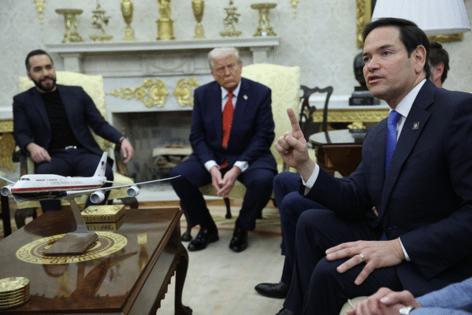El Salvador president says he won't return migrant deported to his country because of Trump administration error
Published in News & Features
WASHINGTON — El Salvador President Nayib Bukele said in the Oval Office on Monday he has no intention of returning a Maryland man mistakenly deported to his country by the Trump administration and being held in a mega prison.
“How can I smuggle a terrorist into the United States? I don’t have the power to return him to the United States,” said Bukele, seated next to President Donald Trump. The summit marked the first visit by a Latin American head of state during Trump’s second term.
Bukele’s comments came after several top Trump Cabinet officials said it was up to El Salvador to determine the fate of Kilmar Abrego Garcia, who was deported during a mass deportation operation March 15. The Trump administration has admitted in federal court documents that his deportation had been an “administrative” error.
Attorney General Pam Bondi said two courts had ruled Abrego Garcia to be a member of the MS-13 gang and that his fate was “up to El Salvador.” If Bukele agreed to return Garcia, the U.S. would provide a plane for his transfer, Bondi added.
A federal judge and a federal appeals court has found that there is little evidence that Abrego Garcia was ever a gang member.
But Stephen Miller, a deputy White House chief of staff, indicated that even if Abrego Garcia was returned, the U.S. could deport him a second time since he is not a U.S. citizen.
“He had a deportation order that was valid, which meant that under our law he is not even allowed to be present in the United States and had to be returned because of the foreign terrorist designation,” Miller said.
While the U.S. Supreme Court ruled unanimously last week that the Trump administration had to facilitate the return of Abrego Garcia, Miller seized on a particular detail in the court document that no district court holds the power to compel U.S. foreign policy.
“No version of this legally ends up with him every living here, because he is a citizen of El Salvador,” Miller said.
Born in El Salvador, Abrego Garcia moved to the U.S. in 2011. He was residing legally in Maryland under a 2019 court order that barred his deportation to El Salvador due to the risk of persecution by local gangs.
Bukele showed no interest in releasing Abrego Garcia to the U.S. or inside El Salvador, trumpeting his record of cracking down on crime and gang violence that ravaged his country for years.
“You want us to go back to releasing criminals so we can go back to being the murder capital of the world?” Bukele asked reporters.
Trump lauded Bukele for helping him carry out the mass deportations of migrants he relentlessly promised voters on the campaign trail and indicated he wanted to send more migrants to the country’s high-security prison.
“I have the best relationship with him,” Trump said of Bukele.
Mneesha Gellman, an associate professor of political science at Emerson University who has studied El Salvador politics, said the deportations are lucrative for El Salvador since the U.S. is paying a per-person fee to Bukele’s government.
“Bukele’s visit may be part business deal, part symbolic association showing that Trump has Bukele’s full support, at a time when the gutting of USAID has sent El Salvador’s social services nonprofit sector in a tailspin, as many of those organizations relied in some form on U.S. aid,” Gellman said.
Ahead of his White House visit, Bukele also scored a significant diplomatic feat. Last Tuesday, the State Department upgraded El Salvador’s travel rating to a coveted Level 1, a long-sought goal of Bukele that designates the country as one of the safest places to travel on the globe.
_____
©2025 McClatchy Washington Bureau. Visit mcclatchydc.com. Distributed by Tribune Content Agency, LLC.







Comments